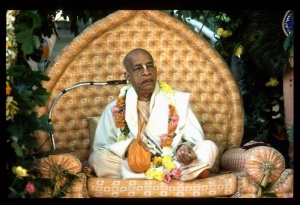SB 7.10.9: Difference between revisions
m (1 revision(s)) |
No edit summary |
||
| Line 1: | Line 1: | ||
{{info | {{info | ||
|speaker= | |speaker=Prahlāda Mahārāja | ||
|listener=Lord | |listener=Lord Nṛsiṁhadeva the Supreme Personality of Godhead | ||
}} | }} | ||
[[Category:Srimad-Bhagavatam - Canto 07 Chapter 10|s09 ]] | |||
[[Category:Bhagavatam Verses Spoken by Prahlada Maharaja - Vanisource|071009]] | |||
<div style="float:left">'''[[Srimad-Bhagavatam]] - [[SB 7|Seventh Canto]] - [[SB 7.10: Prahlada, the Best Among Exalted Devotees|Chapter 10: Prahlāda, the Best Among Exalted Devotees]]'''</div> | |||
<div style="float:right">[[File:Go-previous.png|link=SB 7.10.8]] '''[[SB 7.10.8]] - [[SB 7.10.10]]''' [[File:Go-next.png|link=SB 7.10.10]]</div> | |||
{{RandomImage}} | |||
==== TEXT 9 ==== | ==== TEXT 9 ==== | ||
<div | <div class="verse"> | ||
vimuñcati yadā kāmān | :vimuñcati yadā kāmān | ||
mānavo manasi sthitān | :mānavo manasi sthitān | ||
tarhy eva puṇḍarīkākṣa | :tarhy eva puṇḍarīkākṣa | ||
bhagavattvāya kalpate | :bhagavattvāya kalpate | ||
</div> | </div> | ||
| Line 17: | Line 22: | ||
==== SYNONYMS ==== | ==== SYNONYMS ==== | ||
<div | <div class="synonyms"> | ||
''vimuñcati''—gives up; ''yadā''—whenever; ''kāmān''—all material desires; ''mānavaḥ''—human society; ''manasi''—within the mind; ''sthitān''—situated; ''tarhi''—at that time only; ''eva''—indeed; ''puṇḍarīka-akṣa''—O lotus-eyed Lord; ''bhagavattvāya''—to be equally as opulent as the Lord; ''kalpate''—becomes eligible. | |||
</div> | </div> | ||
| Line 24: | Line 29: | ||
==== TRANSLATION ==== | ==== TRANSLATION ==== | ||
<div | <div class="translation"> | ||
O my Lord, when a human being is able to give up all the material desires in his mind, he becomes eligible to possess wealth and opulence like Yours. | O my Lord, when a human being is able to give up all the material desires in his mind, he becomes eligible to possess wealth and opulence like Yours. | ||
</div> | </div> | ||
| Line 31: | Line 36: | ||
==== PURPORT ==== | ==== PURPORT ==== | ||
<div | <div class="purport"> | ||
Atheistic men sometimes criticize a devotee by saying, "If you do not want to take any benediction from the Lord and if the servant of the Lord is as opulent as the Lord Himself, why do you ask for the benediction of being engaged as the Lord's servant?" Śrīdhara Svāmī comments, bhagavattvāya bhagavat-samān aiśvaryāya. Bhagavattva, becoming as good as the Supreme Personality of Godhead, does not mean becoming one with Him or equal to Him, although in the spiritual world the servant is equally as opulent as the master. The servant of the Lord is engaged in the service of the Lord as a servant, friend, father, mother or conjugal lover, all of whom are equally as opulent as the Lord. This is acintya-bhedābheda-tattva. The master and servant are different yet equal in opulence. This is the meaning of simultaneous difference from the Supreme Lord and oneness with Him. | Atheistic men sometimes criticize a devotee by saying, "If you do not want to take any benediction from the Lord and if the servant of the Lord is as opulent as the Lord Himself, why do you ask for the benediction of being engaged as the Lord's servant?" Śrīdhara Svāmī comments, ''bhagavattvāya bhagavat-samān aiśvaryāya''. ''Bhagavattva'', becoming as good as the Supreme Personality of Godhead, does not mean becoming one with Him or equal to Him, although in the spiritual world the servant is equally as opulent as the master. The servant of the Lord is engaged in the service of the Lord as a servant, friend, father, mother or conjugal lover, all of whom are equally as opulent as the Lord. This is ''acintya-bhedābheda-tattva''. The master and servant are different yet equal in opulence. This is the meaning of simultaneous difference from the Supreme Lord and oneness with Him. | ||
</div> | </div> | ||
__NOTOC__ | |||
<div style="float:right; clear:both;">[[File:Go-previous.png|link=SB 7.10.8]] '''[[SB 7.10.8]] - [[SB 7.10.10]]''' [[File:Go-next.png|link=SB 7.10.10]]</div> | |||
__NOTOC__ | |||
__NOEDITSECTION__ | |||
Revision as of 16:38, 4 June 2021

A.C. Bhaktivedanta Swami Prabhupada
TEXT 9
- vimuñcati yadā kāmān
- mānavo manasi sthitān
- tarhy eva puṇḍarīkākṣa
- bhagavattvāya kalpate
SYNONYMS
vimuñcati—gives up; yadā—whenever; kāmān—all material desires; mānavaḥ—human society; manasi—within the mind; sthitān—situated; tarhi—at that time only; eva—indeed; puṇḍarīka-akṣa—O lotus-eyed Lord; bhagavattvāya—to be equally as opulent as the Lord; kalpate—becomes eligible.
TRANSLATION
O my Lord, when a human being is able to give up all the material desires in his mind, he becomes eligible to possess wealth and opulence like Yours.
PURPORT
Atheistic men sometimes criticize a devotee by saying, "If you do not want to take any benediction from the Lord and if the servant of the Lord is as opulent as the Lord Himself, why do you ask for the benediction of being engaged as the Lord's servant?" Śrīdhara Svāmī comments, bhagavattvāya bhagavat-samān aiśvaryāya. Bhagavattva, becoming as good as the Supreme Personality of Godhead, does not mean becoming one with Him or equal to Him, although in the spiritual world the servant is equally as opulent as the master. The servant of the Lord is engaged in the service of the Lord as a servant, friend, father, mother or conjugal lover, all of whom are equally as opulent as the Lord. This is acintya-bhedābheda-tattva. The master and servant are different yet equal in opulence. This is the meaning of simultaneous difference from the Supreme Lord and oneness with Him.